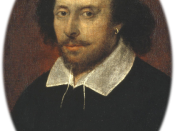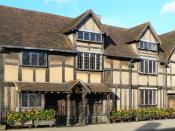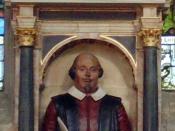William Shakespeare During the Elizabethan Age, named after the reign of Queen Elizabeth, the plague reached a small sleepy town called Stratford-upon-Avon. Whole households perished resulting in one-sixth of England's population being wiped out. Coming to power at the age of 25, Queen Elizabeth's first reigning year brought peace to a country which had been at war since the reign of her father. A child born during the Elizabethan Age had a difficult life ahead. William Shakespeare, born in Stratford-upon-Avon, grew up in a boisterous village town in Elizabeth's kingdom. The town was full of elm trees providing surroundings favoring a woodland forest. Around the corner from the local cattle market, named Rothermarket, houses were situated just on the edge of the elm trees, making the trees a natural town boundary. Rothermarket was on the outskirts of town because cattle got slaughtered here; the stench and noise coming out of the market proved amazingly awful.
The town council had trouble with dung piles in the street and pigs ran loose in the alleyways. Yet from the dire straights of Stratford-upon-Avon was born one of life's most influential writers, William Shakespeare. William Shakespeare has left a lasting legacy through his true to personal life writing ability, extraordinary playwriting skills, and interesting conversation concerning the controversy to authorship.
William Shakespeare was born on April 23, 1564 in Stratford-upon-Avon, England, to parents John and Mary Shakespeare. Shakespeare was a fairly common name in the villages to the north of Stratford-upon-Avon. Attending a public grammar school, taught mostly in Latin, William Shakespeare went further than any other author by exploiting the language in both the romantic as well as a classical sense. William Shakespeare's education, cut short, proved to be sufficient for his purposes. Being a naturally clever schoolboy,


